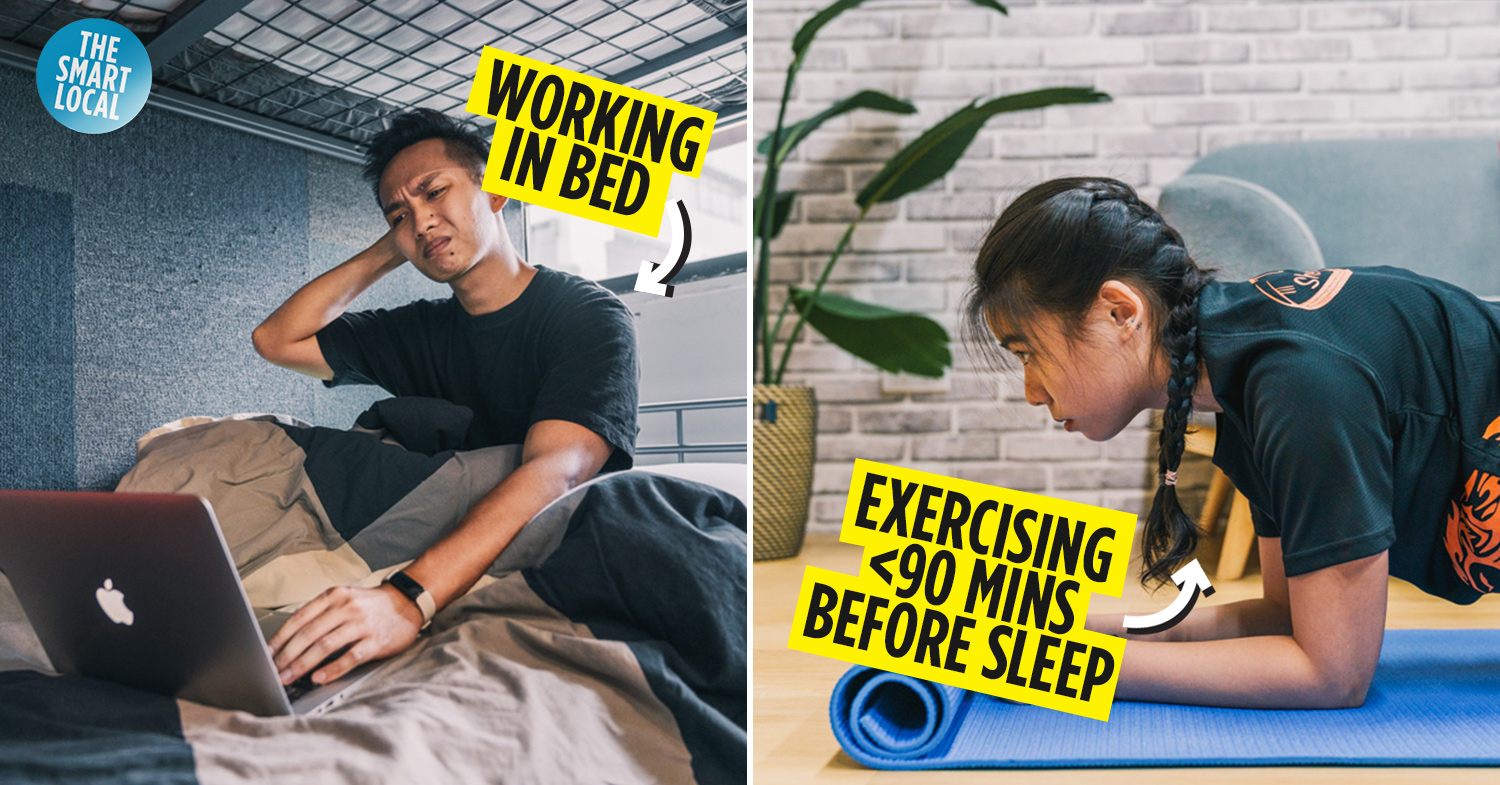Bad sleeping habits
If I had to choose between spamming multiple cups of coffee to keep myself going or a good night’s sleep, I’d choose the latter. But it’s easier said than done. Some nights, I’m left staring at the ceiling for hours before I doze off, which results in me feeling lethargic the next day.
Insomnia can have many triggers – stress, diet and exercise are just a few of the many causes. Besides the more common ones, there are actually other inconspicuous reasons that contribute to poor sleep too. Here are 7 bad sleeping habits you might not be aware of and how to fix them ASAP.
1. Keeping your phone by your bed as an alarm
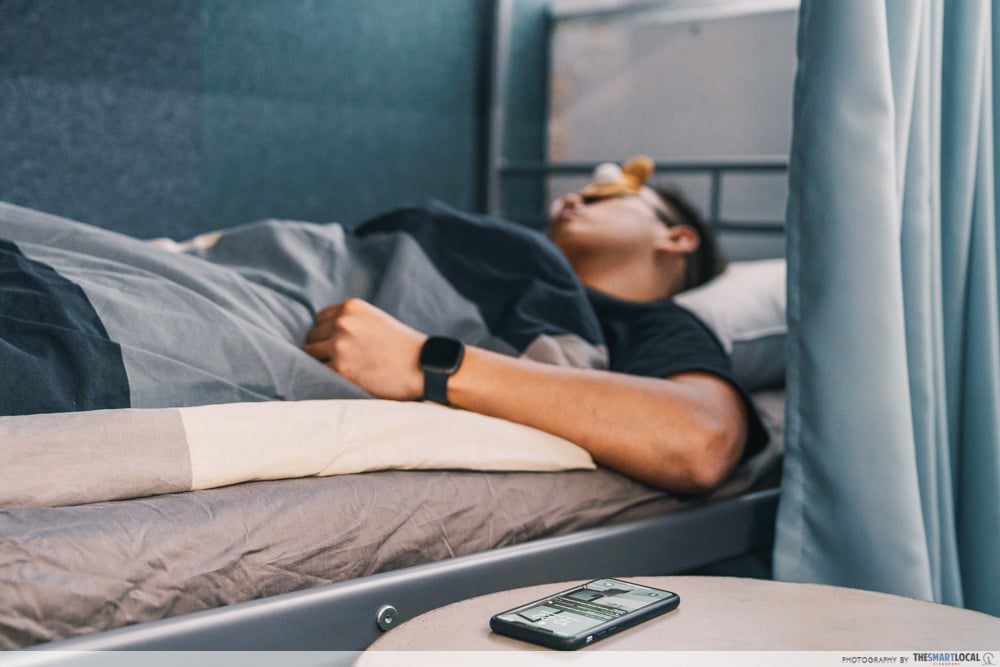
Our almighty smartphones have many capabilities, with alarm settings being one of them. But using your phone as a bedside alarm can actually do more harm than good. Electronic devices give off blue light – a type of light that can inhibit the production of the sleep-inducing hormone, melatonin. This makes it harder for you to fall asleep since it tricks your mind into thinking it’s daytime.
If you have a tendency to scroll through your phone while trying to fall asleep and check it in the middle of the night, they also result in more interrupted sleep.
Solution: Turn your phone to Night Shift mode to change your screen display settings to one that is less stimulating. Keeping it away from your bed will also reduce the chances of you reaching for it during pee or water breaks in the middle of the night.
If you pair your phone with gadgets like the Fitbit Sense, you can also track your sleeping patterns for further insights and also toggle the Sleep Mode function on to prevent notifications from lighting up at night.
2. Doing work in bed instead of a designated work area

For those without a proper desk at home, working from our beds would have probably been the default alternative – especially during the Circuit Breaker. However, this subconsciously associates your bed with wakefulness – which explains why you think about that unreplied email instead of drifting off to sleep at night.
Working from your bed also blurs the line between leisure time and official “office” hours, since you feel like you’re doing both – this results in more OT than you might realise. Instead of working throughout your day, take the hour before bedtime to indulge in a relaxing activity, like reading a book to wind down.
Solution: Only do your work at a designated work area, and stop work at least one hour before bed time.
3. Consuming alcohol before bed

With alcohol sales not permitted past 10.30PM indefinitely, the next best thing is to have a glass of wine or a can of beer at home. But contrary to popular belief, alcohol before bed doesn’t necessarily mean you’ll be sleeping like a baby. In fact, it could actually be quite the contrary.
Although you’ll definitely be able to fall asleep faster, your Rapid Eye Movement (REM) sleep – which is the state of sleep where dreaming occurs – will be affected. Less REM sleep actually causes drowsiness the next day and poor concentration – which we more commonly acknowledge as a hangover.
High amounts of alcohol before sleep also results in a higher chance of sleepwalking, sleep talking and other problems with memory.
Solution: Avoid alcohol at least 4 hours before hitting the sack to ensure quality sleep.
4. Doing home workouts just before sleep
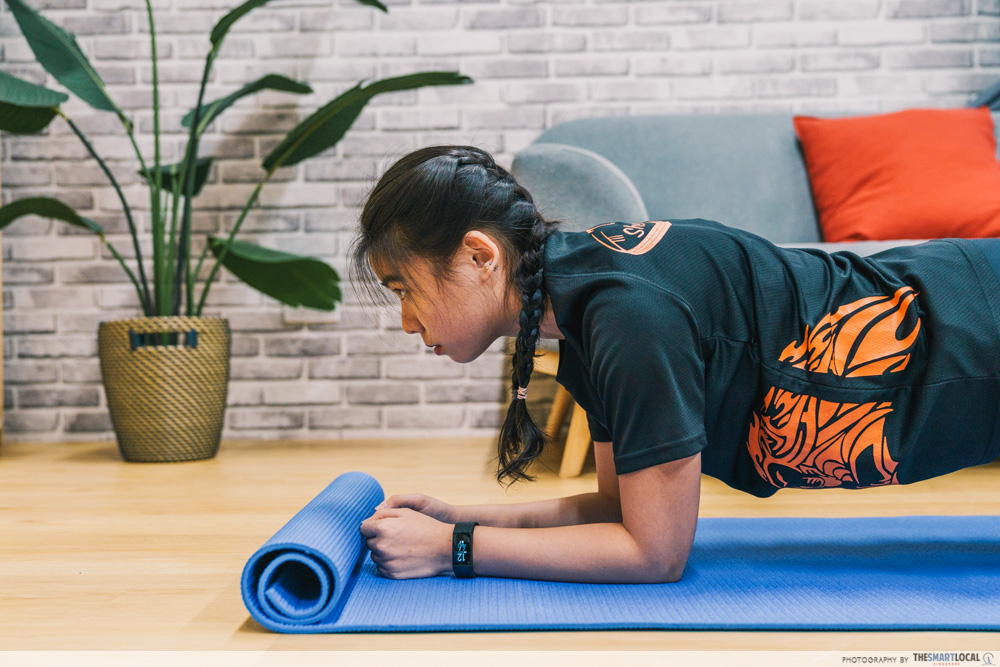
Exercising contributes to better sleep, but only when done at the right time. As a rule of thumb, one should allow for at least 90 minutes of cooling down before bed time. Any less, and your core body temperature will likely keep you awake. If you’ve been squeezing in late-night gym sessions, it’s time for you to consider changing up your schedule.
Studies have shown that doing vigorous workouts like HIIT exercises stimulates your nervous system and raises your heart rate, making it hard for you to fall asleep. However, doing light activities like stretching or short sets of static exercises can help your body wind down for a better night’s rest.
Solution: Avoid vigorous activity for at least 90 minutes before bedtime and stick to light to moderate-intensity activities at night such as meditations instead. If you have a Fitbit device, their Premium membership also provides guided programmes that can improve one’s sleep habits.
5. Getting into bed too early
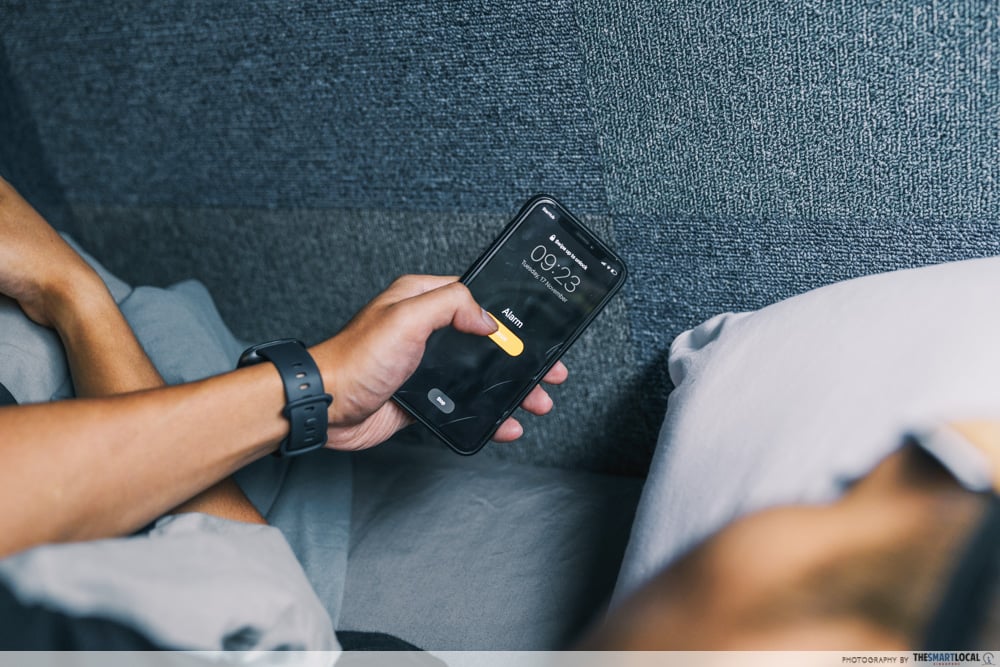
Although adults are recommended seven to nine hours of sleep each night, turning in early before an important day has never done me any good. The sleepless nights during my ‘A’ Level exam period is testament of that. Sometimes, turning in too early can result in sleep anxiety instead, especially when you’re nervous about a big day you’re about to have.
Increased levels of arousal signals your body to keep tossing and turning all night, resulting in you staying awake instead of getting proper rest. The habit of reviewing your to-do list for the next day each night can also result in problematic sleep conditioning since your mind will constantly be in a state of worry.
Solution: Only get into bed when you are feeling sleepy, not just tired. Else, you might physically be resting but your mind will keep you awake.
6. Sleeping in on the weekends
After five days of forcing ourselves up at 7AM for work or school, all we want to do on the weekend is to sleep in without waking to an alarm. However, sleeping in on the weekend can actually throw your sleep cycle off-track and worsen your sleep debt. It would even make it harder for you to wake up on Monday mornings, resulting in a brutal never-ending cycle.
Solution: Try to wake up at the same time every day – including weekends – to have a constant schedule. Make up for lost sleep on the weekends by taking 20-30 minute power naps instead, which have proven to improve memory and lift overall mood levels.
7. Watching Netflix before bed
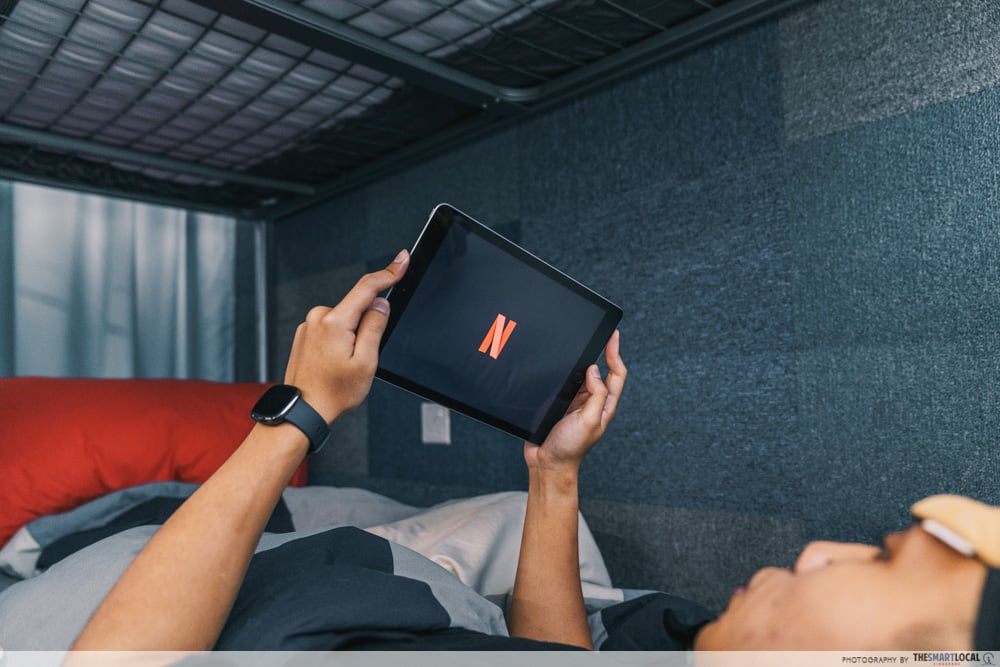
Most of us like to take comfort in Netflix shows before turning in. But before you know it, one Friends episode becomes half the season done – and it’s 3AM. Although we’re encouraged to relax before snuggling under our sheets, watching Netflix before bed can actually encourage pre-sleep arousal.
Even after closing your Netflix tab, your brain remains in a state of arousal for some time to process what you’ve just watched, which makes it harder to fall asleep. It’s all the more worse when you watch intense documentaries or nonfiction content that can cause your brain to be more stimulated and deeper in thought.
Solution: Try to avoid watching shows for an hour before bedtime. To curb that itch to binge-watch your new favourite series, turn off all auto-play options in your settings.
Fix bad sleeping habits and keep track of your sleep with Fitbit Sense

While there’s no fool-proof method to get the ultimate beauty sleep you want, taking note of these bad sleeping habits is the first step towards making changes to your lifestyle.
With better sleep hygiene, you’ll be able to wake up refreshed in the morning, and maybe even get through your day without being overly reliant on that daily cup of caffeine.
It can be hard to know how to implement these changes to your lifestyle if you don’t know much about your sleep habits. But with the Fitbit Sense, you’ll be able to interpret your sleep quality with a sleep score & track your sleep stages with your resting heart rate.
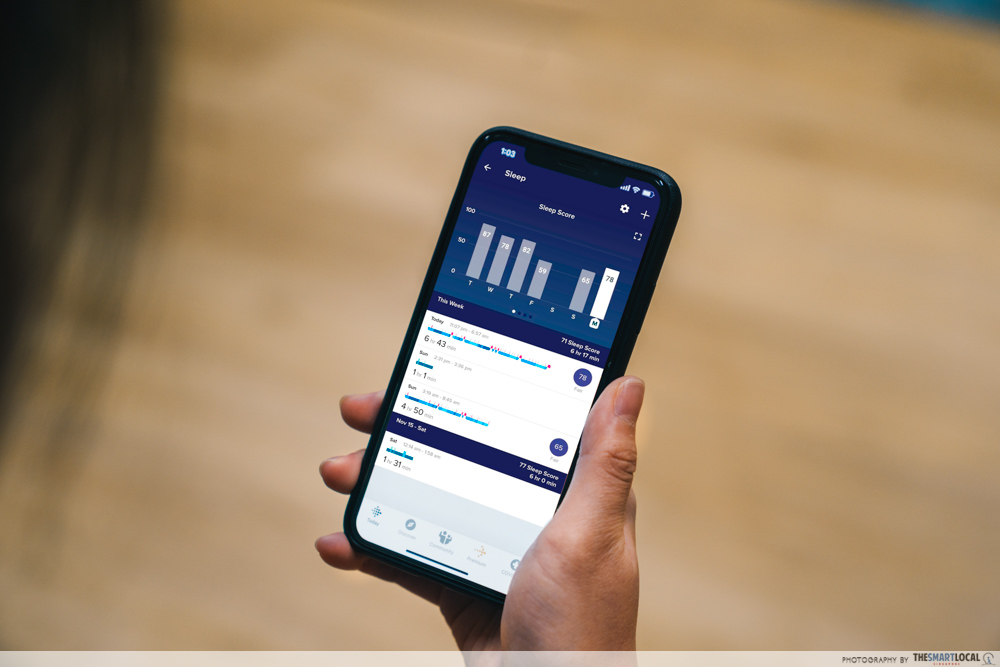 Premium users have access to a detailed analysis of their sleep
Premium users have access to a detailed analysis of their sleep
Image credit: Fitbit
The Fitbit Sense also tracks the amount of time that you spend in light, deep and REM sleep by showing your daily Sleep Score – either on your wrist or via the Fitbit app (Fitbit on iOS | Fitbit on Android).
Unlike the jarring alarms from our phones and alarm clocks, the Smart Wake function on your watch detects when you’re in a light sleep stage and wakes you up within 30 minutes of your desired wake-up time.
You can also enjoy uninterrupted snoozing with the Sleep Mode function on the Fitbit Sense, which mutes smartphone notifications and stops your Fitbit screen from lighting up at night. Set up Sleep Mode to turn on automatically, which will also help indicate bedtime for a more consistent sleep schedule.
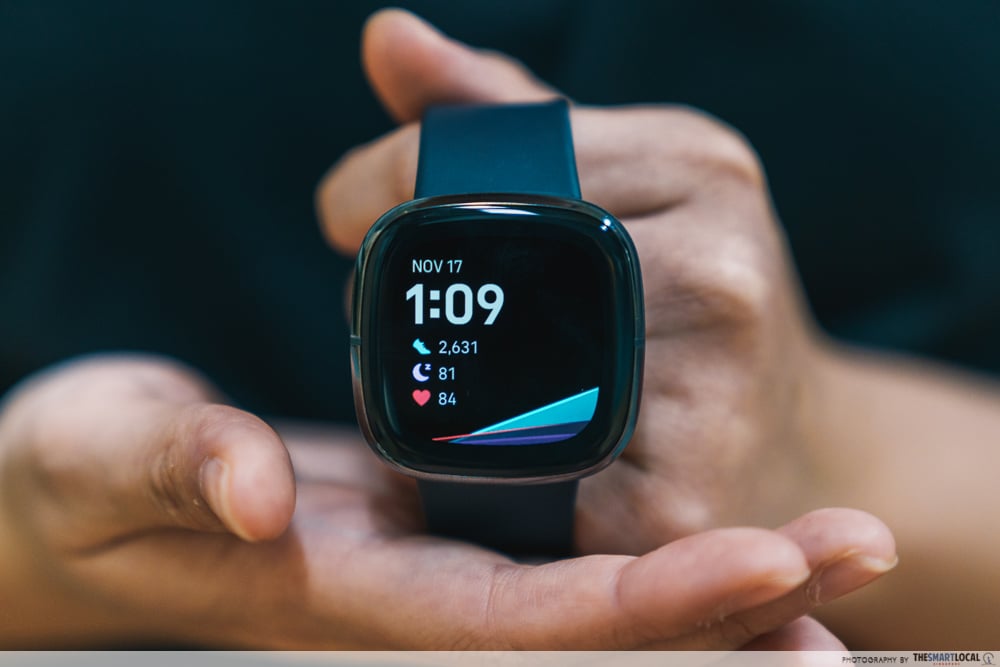
Other than sleep functions, the Fitbit encompasses other functions such as activity, nutrition, and stress management to ensure that you’re not only fit, but healthy overall. For example, the Active Zone Minutes function helps you make every minute count during workouts by buzzing your wrist when you enter your personalised target heart rate zone.
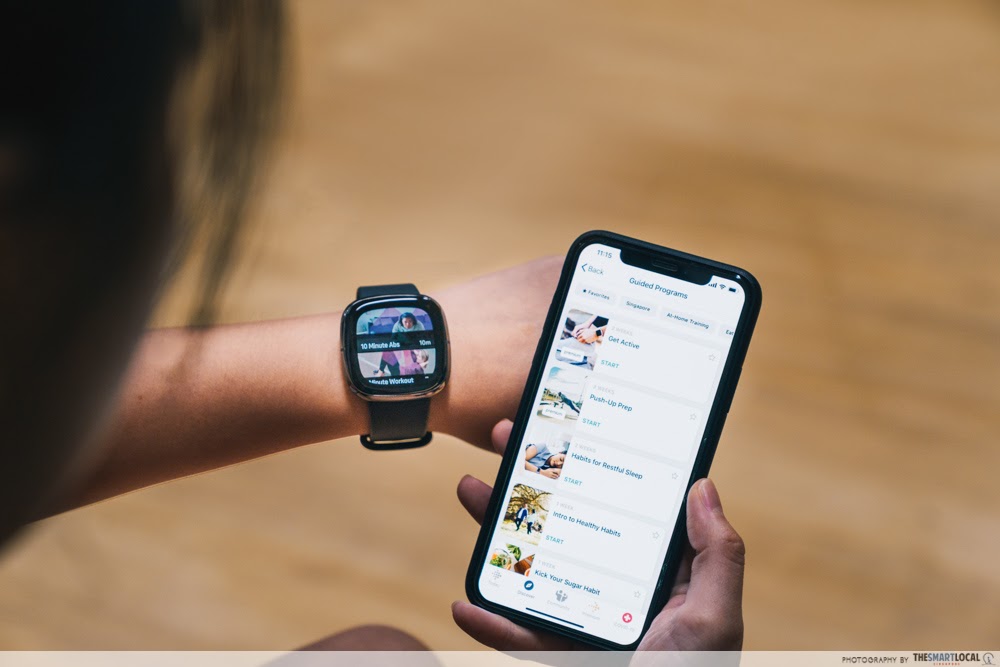
With the Fitbit Sense, you’ll also be able to unlock a free 6 month membership for Fitbit Premium for new premium users. This membership not only provides a thorough analysis of your health, it also provides tools such as guided workouts, sleep tools and meditation programmes that you can incorporate into your lifestyle.
If the multitude of functions aren’t enough, the Fitbit Sense also makes for a sleek addition to your OOTD. It comes in an aluminium and stainless steel frame, and the strap is customisable to your liking with options such as woven, leather or metallic band.
With the holidays coming soon, you can reward yourself or your loved ones with a Fitbit Sense to get a headstart on a better and healthier lifestyle. Whether it’s for fitness, stress management or improving sleep quality, this nifty gadget will have you covered.
Find out more about the Fitbit Sense here
This post was brought to you by Fitbit.
Photography by Edmund Wong.
